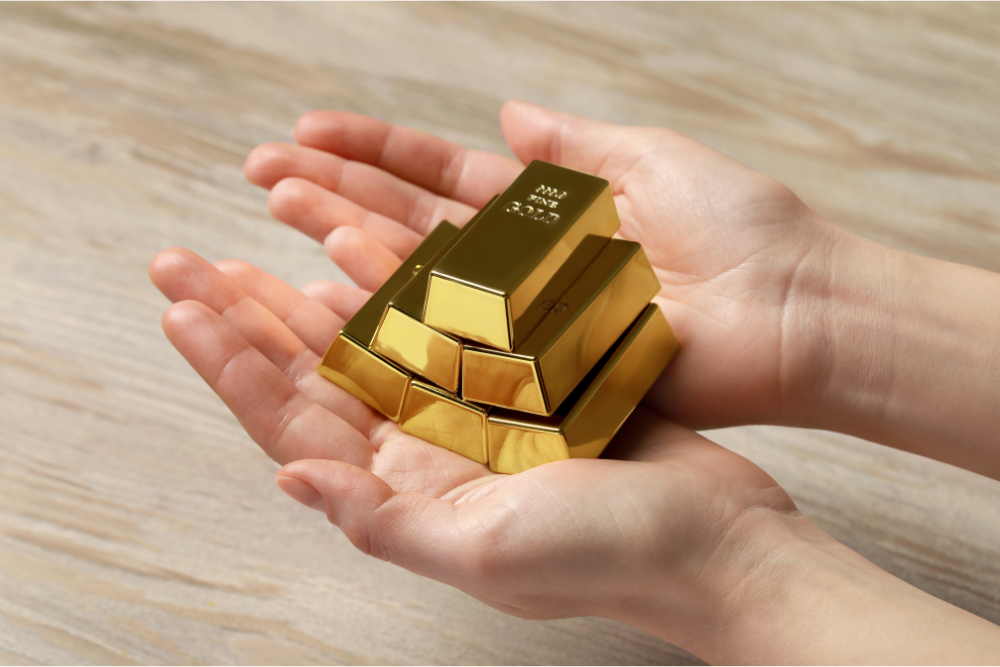The article “FP Answers: Is it wise to invest some savings in gold? If so, what’s the best way?” was originally published in Financial Post on December 15, 2023. By Julie Cazzin with Andrew Dobson.
Gold should be used mainly as a hedge as opposed to a primary asset class.
Q: Is it wise to invest some savings in gold? If so, what’s a good gold exchange-traded fund (ETF), and what percentage of my holdings should be invested there? I’m 50 years old, so how do I know which gold ETF is right for me? — Mary
FP Answers: Gold is a precious metal that has been a form of currency since ancient civilizations. It was even considered the standard basis for the international money system until the past century. Prior to 1914, the Canadian dollar was fixed to the price of gold and convertible to gold on demand.
Today, gold as an investment takes many shapes and forms and there’s been a renewed interest among market participants as the price of spot, or one ounce of, gold bullion has been rising and hit an all-time high of US$2,135 on Dec. 4, 2023.
In your case, Mary, reviewing the rationale to invest in gold is important to determine whether it is a good fit for your portfolio. Given that gold is a single asset class, it is considered higher in risk due to the volatility inherent in tracking one asset versus a basket.
Gold is typically used as a hedge for a portfolio and not as a “long-only” asset to hold to earn a return. On an inflation-adjusted basis, the price of gold is lower today than it was in the early 1980s. However, in fairness, gold has performed very well over the past 20 years since hitting a low around the time the tech bubble burst.
“The problem with commodities is that you are betting on what someone else would pay for them in six months. The commodity itself isn’t going to do anything for you,” Warren Buffett famously once said of gold. “It is an entirely different game to buy a lump of something and hope that somebody else pays you more for that lump two years from now than it is to buy something that you expect to produce income for you over time.”
Gold is used as a hedge because its price is generally not expected to move directionally with the broader capital markets. It has provided positive returns during the past five recessions in the United States. It exists in a limited supply and that has appeal when central banks are printing money and potentially devaluing currencies.
Investors will sometimes include a small allocation to gold in their portfolios for risk diversification. The value of this allocation could be to provide some upside return potential for part of the portfolio when other parts are not performing.
The classic example you may hear is that “gold is inversely correlated to the stock market,” which means that when stock markets go down, we should expect gold to act differently by going up. Used this way in a small allocation, gold could help the investing experience in terms of buffering overall portfolio volatility.
Unfortunately, Mary, gold has garnered somewhat of a reputation for having very aggressive advocates — so-called gold bugs — pushing it as something to invest in as a primary asset class. I would caution against having a high allocation in your portfolio to any single investment, but specifically commodities, as they can be speculative and volatile. The same rule would apply to buying shares of a penny stock.
In selecting a gold ETF, you have access to Canadian- or U.S.-listed ETFs at all major brokerages. There are several options, so you must review factors such as whether you want to own gold bullion or gold stocks, the embedded management expense fees and other factors to determine the correct fit. It does not simply come down to performance because each ETF will have its own set of unique considerations.
For example, the largest physically backed gold ETF in the world is SPDR Gold Trust, which tracks physical gold bullion prices. Canadian ETF issuers such as BlackRock Inc.’s iShares, Sprott Inc. and Purpose Investments Inc. also have gold bullion funds trading on the Toronto Stock Exchange. The iShares S&P/TSX Global Gold Index ETF provides global exposure to shares of gold producers, so you are buying gold stocks instead of gold bullion.
Keep in mind that if you invest in U.S.-listed gold ETFs, it may increase currency conversion costs, Canadian tax reporting requirements for taxable accounts or expose you to U.S. estate tax upon death.
Should you be investing in gold? In my experience, a minority of investors do so. But if you do, Mary, consider some of the factors above and use it mainly as a hedge as opposed to a primary asset class.
Andrew Dobson is a fee-only, advice-only certified financial planner (CFP) and chartered investment manager (CIM) at Objective Financial Partners Inc. in London, Ont. He does not sell any financial products whatsoever. He can be reached at adobson@objectivecfp.com.

